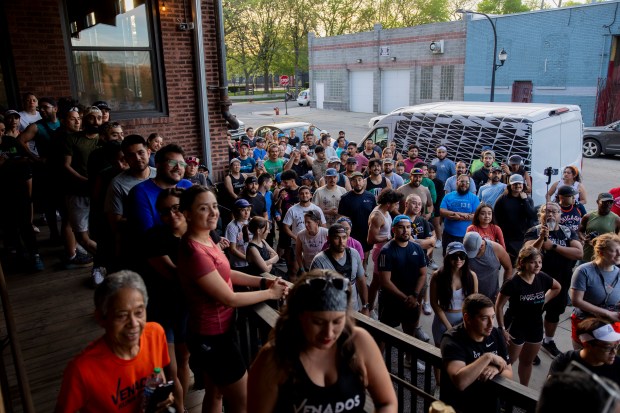Enrique Rivera lived in Pilsen long before Time Out magazine named 18th Street one of the “Coolest Streets in the World” earlier this year. He was there decades before the upscale restaurants and walking tours around the neighborhood and before the luxury houses and condominiums brought thousands of new faces to the area, displacing many of its working-class immigrant population.
The Pilsen neighborhood that Rivera grew up in was plagued by street violence but deeply rich in muralism and immigrant-owned shops that shaped its strong Mexican identity.
Despite the recent changes, nothing erodes the fabric of the community that has been woven over generations, including his, Rivera said. He and his family still live in the same house that his parents bought when they moved to Pilsen from Mexico in 1961.
He loved Pilsen then and he loves Pilsen now, he said. So when the opportunity came to open a business in the area, he took it.
Earlier this month Rivera and a group of friends-turned-business partners celebrated the grand opening of Monochrome Brewing. The new brewery, at 2101 S. Carpenter St., breathes fresh life into the space once occupied by Lo Rez Brewery & Taproom, which shuttered its doors last year after seven years of operation.
Drawing inspiration from Pilsen’s vibrant community and rich culture, Monochrome Brewing reflects the evolving landscape of Pilsen, where Latino-owned and -inspired businesses are reclaiming previously “trendy” spaces in the face of ongoing gentrification. The emerging trend is more than just a business endeavor: It’s a concerted effort by community stakeholders to preserve the neighborhood’s cultural identity while encouraging community members to reinvest in their own backyard.
The brewery is the latest business to open in Pilsen that is partially or fully owned by a Latino with roots in Chicago’s South Side. A report from UIC’s Great Cities Institute released last May suggests the movement could be driven by a growing number of Latinos living in the area who are college-educated and making more money.
Last fall, Kevin Canchola and his partner took over the location of Belli’s, near Pilsen’s Plaza Tenochtitlan, a previously vegan juice bar that was transformed, both in name and menu, to reflect the neighborhood while maintaining the focus on health-conscious meals. Next month, a Mexican seafood restaurant takes the reins from Dusek’s in Thalia Hall. One of the new owners, Marco Ascensio, said he wants to enrich the gastronomic tapestry of the neighborhood but keep the flavors of its immigrant roots.
For Rivera, opening his own brewery has been a dream come true.
“I just love Pilsen, and the area has changed so much but as long as this generation and next generation stay in the neighborhood, invest in the community, we can make it into the place we’ve always called home,” said Rivera, who attended St. Ignatius College Prep and has a graduate degree from University of Illinois at Chicago.
Monochrome “is more than a brewery. It’s a space by the community and for the community,” he said.
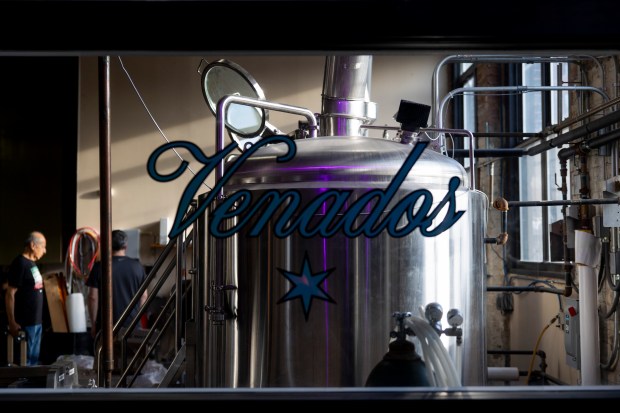
When the former owner of Lo Rez told Rivera he was planning to close the brewery that had been home to Venados, the running club that Rivera’s father helped to establish in the 1980s, the dream became a possibility.
Rivera, a lover of craft beer, was already friends with Dave Coyle, who is from McKinley Park and owns a brewery in Michigan. The two knew brewer Luis Flores, the mastermind behind the unique craft beer offered at Monochrome. Enriqueta Hibbard, an avid runner, and Rivera’s aunt, joined the group to make the dream a reality.
The four business partners took over the space that brought in hundreds in their opening week. Many of them are loyal supporters and friends of the Rivera family, who fostered the relationships through the running community over the last three decades.
“Enrique loves beer, Enrique loves Pilsen. It can’t get more community than that,” said Michael Rojas, a member of the Venados running club since 2020.
Following his father’s footsteps, Rivera developed a love for running and for Venados when they would meet in the front yard of their home.
Eliberto Rivera, now 74, recalled helping to form the club when a group of his friends decided to start running together to support each other in a space where there were few Latinos. The group was made up of friends and family.
Today, it religiously gathers more than 150 runners every Wednesday evening to run 3 to 5 miles despite rain or snow. Most stay to have a beer after.
Venados and the community it has brought together is what makes the new venture special, Hibbard said.
“It’s a business that started out of the community already around it,” she said. “When we learned that (Lo Rez) was closing it was sad because the space had become a space where friends and family would gather, sharing stories and memories.”
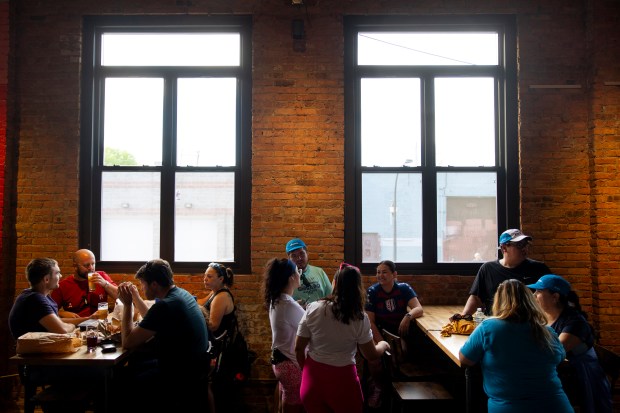
Hibbard and Rivera had been exploring ways to invest in the neighborhood, but they did not want to leave the place they call home, she said. Opening the brewery “was all very organic.”
Rivera, Coyle and Flores were brought together through their love of beer after meeting at Coyle’s brewery, Arclight Brewing Co. in Michigan. When Rivera told Coyle and Flores of the opportunity, they jumped on board with Flores’ brand Monochrome as their flagship.
Flores, a self-taught brewer raised in Southeast Chicago, said he is inspired by the project because he’s always wanted to have his own brewery. The menu will carry Mexican-inspired beers along with his traditional pour and collaborations with other brewers.
“It’s pretty rare to run into a Mexican brewer or even a Latin American brewer,” Flores said, recalling how his mother would scold him for learning to brew at home with his brother.
Monochrome’s menu will include Flores’ arsenal of different styles and he plans to add “fun styles” of hard seltzers, beer and noalcoholic drinks with Mexican flavors.
“I’m so proud of them because I’ve seen how much work and passion they have put into the project,” said Juana Rivera, 78, Rivera’s mother. “I hope that what they’re doing can inspire other young Latinos to show them that it is possible to stay.”
Latinos succeed
The new Pilsen that Rivera and his partners are betting on boasts new and renovated homes that sell for over $500,000, some even reaching $1 million. The median income has jumped nearly 40% over the past decade, from around $43,000 to $60,000 according to the report from UIC’s Great Cities Institute.
Despite the higher rents and rising property taxes, the area continues to be predominantly Latino, making up 71% of the population in 2020, according to U.S. census data.
But the census data showed that in 1990, Latinos accounted for 88% of the population. The data suggests that gentrification solidified throughout the Lower West Side during the last two decades, continuously losing low-income Mexican immigrant working-class families but attracting professional single or coupled Latinos without children.
The findings from the UIC study also show that more Latinos in the area are college-educated and thus have a higher income. Latinos over age 25 with a bachelor’s degree or higher nearly tripled over the last two decades.
“What we landed on was that gentrification that has occurred, has not been an exact displacement yet of Latinos, versus it has been a shift in the types of households of Latinos,” said Alexander Linares, one of the authors of the latest research. “It has less to do with the working class and more to do with the middle class. And that could also be taken in a positive way, right?”
This shift could be depicted as ‘gentefication,’ a term popularized to describe how neighborhoods change when college-educated, higher-earning Latinos invest and live in the changing area. It’s a twist to the word gentrification by adding ‘gente,’ or ‘people’ in Spanish.
While some may criticize the move because the displacement of immigrant lower-income Latinos continues, others celebrate the upward mobility of first- and second-generation Latinos fulfilling their parents’ dreams.
Marcos Ascensio, one of the chefs and headmasters of the project taking over Dusek’s, said they decided to bring a Mexican seafood concept to the neighborhood because “Pilsen needs a good seafood place.”
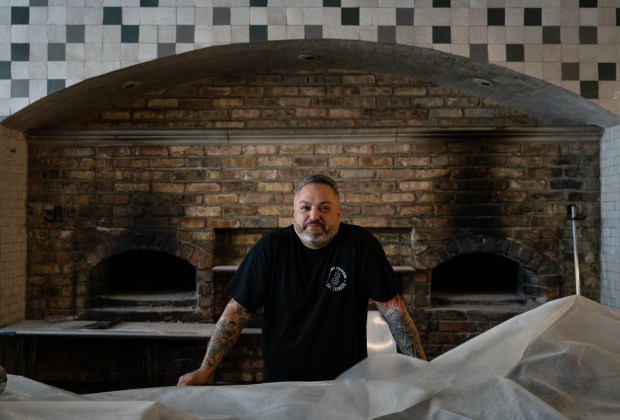
Ascensio grew up in the Little Village neighborhood where he learned the appreciation that Mexican people have for seafood, but said there are very few restaurants offering the fusion with the technique and culture that his restaurant intends to offer. His team from the Logan Square neighborhood’s Taqueria Chingon — including Obelix and Le Bouchon’s Oliver Poilevey — are partnering with owners 16” on Center to open the new restaurant.
The new restaurant, Mariscos San Pedro, at 1227 W. 18th St., will cater to the neighborhood’s natives and visitors drawn by its strong Mexican heritage. “Mexicans will pay for good seafood,” he said. “So putting this place here was just fitting.”
For Ascensio, the project — a dream come true for a boy from the Southwest Side — is about providing a menu for the children of immigrants working to stay in the neighborhood, for their parents who have inspired his culinary work and inviting newcomers to try their quality food.
Though gentefication can bring investment and revitalization to neglected areas, it often comes at the cost of pushing out the very people who give these neighborhoods their character, said Javier Yanez, a co-founder and board member of the Pilsen Chamber of Commerce. Some small-business owners who have been in the area for decades worry they won’t be able to keep up with the high property taxes and rising rents.
Development and preservation
Through this movement, however, Latinos can remain as community stakeholders, which could mean that they will continue the grassroots efforts or support nonprofits to create affordable housing for immigrant working-class families and oppose spikes in property taxes, Yanez said.
The Pilsen Chamber of Commerce has been organizing meetings with business owners to find ways for community development projects to empower the businesses already there and encourage local residents to invest in the area.
“It comes down to finding the capital needed to do that,” Yanez said. The chamber of commerce, he said, helps to guide entrepreneurs to find that capital.
But he added that it’s crucial to strike a balance between revitalization and preservation to ensure that Pilsen can thrive without losing its identity and diversity.
“We just need to continue to support that type of growth and open the doors and say: ‘Hey, you can do it here, in the same place where you grew up,’” he said. “That speaks volumes — about our economic power, but more so about our love for our community.”
The new brewery, he said, is a “perfect example” of how longtime residents can find ways to stay in the neighborhood and be a part of the stakeholders that can help preserve Pilsen and its people.
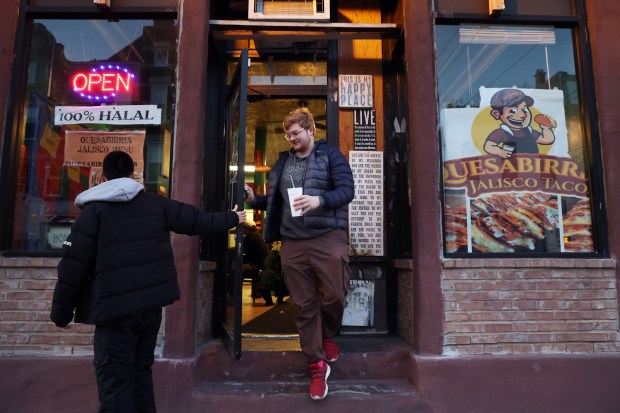
Closer to Blue Island Avenue, Quesabirria Jalisco opened in early 2023 at a storefront formerly occupied by Casa Indigo at 1314 W. 18th St. Ventura Orozco, the new owner, hails from the Back of the Yards neighborhood but has “deep roots” in Pilsen from his mother’s side. He spent most of his adult life in Mexico, but when he returned to the United States a few years ago he saw Pilsen’s potential as a hub for culinary tours.
“What better place to do it than Pilsen, right?” he asked. Orozco chose to shift to Pilsen from his initial Little Village location because of its history as a hub for Mexican food and culture.
“The truth is the gentrification that’s going on in Pilsen has made it a hub for everything,” Orozco said. Unlike other new restaurant openings, Orozco kept his style similar to a traditional taquería. He says that classic taquerías are becoming “numbered” on the block. But he’s still optimistic.
“Mexican people come in and say, ‘Thank you for keeping the culture alive on the block.’”
Three surprising rules for sold-out tacos at Quesabirria Jalisco in Pilsen
When Kevin Canchola and his girlfriend, Jovana Torres, took over Belli’s, at 1850 S. Blue Island Ave., in October 2023, they wanted to add a touch of “Latincity.”
The two redesigned Belli’s and renamed it Gracias, María, after Canchola’s Mexican grandmother, who died the same month as Belli’s closure.
Canchola is a third-generation Mexican American who grew up near Midway Airport and lived in Pilsen on and off for over a decade, starting in 2008. He had a childhood connection to the neighborhood: His aunt owned a now-defunct panadería called Josefina’s and he would frequently visit his cousins there.
Since they took over, they’ve added nonvegan Latin-inspired recipes that reflect their family: pozole verde, a chicken salad sandwich inspired by his abuela and protein bites.
“What I see right now is Latino businesses are thriving,” Canchola said. He talks about sending his customers to institutions he grew up on like El Milagro and more recent ones like plant and home goods shop Semillas. “It’s Latinos supporting Latinos right now.”
“I just hope a percentage of it will always be Latino,” Canchola said.

Angélica Varela, Pilsen-based owner of Semillas, 1848 S. Blue Island Ave., said the store was established in 2021 on the same block as Gracias María. Desiring more floral options within her community, she said she thought it was time for her generation of Mexican American millennials to start opening businesses.
Varela takes the meaning of her business seriously. She explains that they try to define themselves as a “seed” in the community that will help others sprout and grow. She sees Semilla’s as a “safe haven” for people to be in touch with nature.
“Not only did they see a Latina opening up a plant shop, they saw someone that looked like them opening something in the neighborhood,” Varela said. “That really wasn’t done before.”


